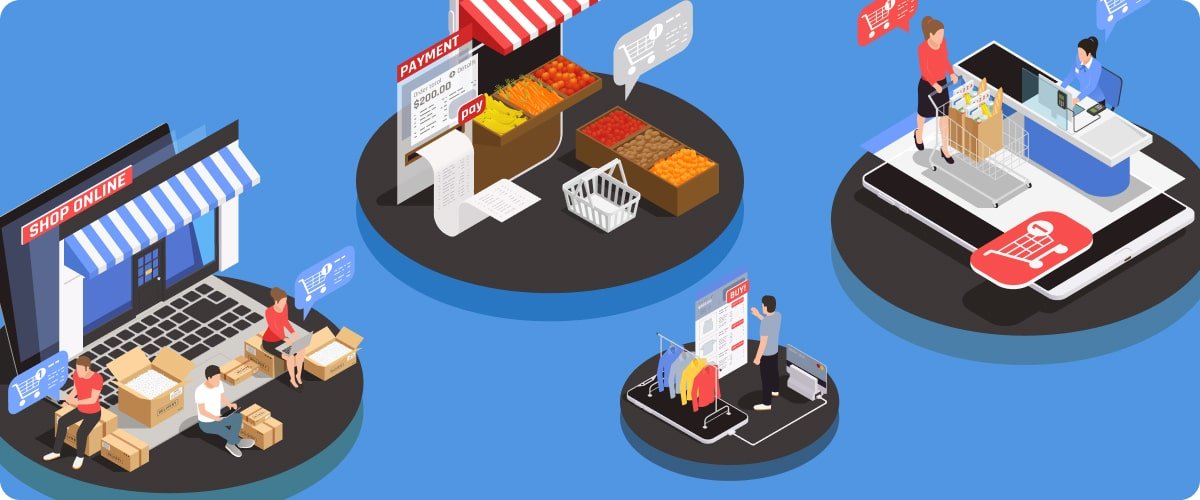From the integration of cutting-edge technologies to the adaptation of sustainable practices, the ecommerce website development industry is poised for transformative changes.
Rise of Reality (AR) and (VR):
Augmented Reality and Virtual Reality are set to redefine the online shopping experience. Ecommerce platforms will increasingly leverage AR and VR technologies to offer immersive product experiences. Consumers will be able to visualize products in their real-world environments, enhancing the decision-making process and reducing the likelihood of returns.
Personalized Shopping Experiences:
Ecommerce platforms will invest heavily in data analytics and artificial intelligence to provide highly personalized shopping experiences. Predictive algorithms will analyze user behavior, preferences, and past purchases to offer tailored product recommendations, leading to increased customer satisfaction and loyalty.

Blockchain for Supply Chain Transparency:
Blockchain technology will gain prominence in the ecommerce sector, particularly for enhancing supply chain transparency. By leveraging blockchain, retailers can ensure the authenticity of products, trace the origin of goods, and create a more secure and trustworthy supply chain. This move towards transparency aligns with the growing consumer demand for ethically sourced and sustainable products.
Sustainable Ecommerce Practices:
Environmental consciousness will drive a shift towards sustainable practices in ecommerce. Retailers will focus on reducing packaging waste, adopting eco-friendly materials, and optimizing transportation logistics to minimize their carbon footprint. Sustainable ecommerce practices will not only appeal to environmentally conscious consumers but also contribute to brand reputation.
Voice Commerce on the Rise:
Voice-activated devices and virtual assistants will play a more significant role in the ecommerce landscape. Consumers will increasingly use voice commands to search for products, place orders, and track deliveries. Ecommerce platforms will need to optimize their interfaces for voice interaction, offering a seamless shopping experience through devices like smart speakers and virtual assistants.
Social Commerce Integration:
Ecommerce businesses will invest in seamless integration with social media, allowing consumers to make purchases directly within these platforms. The integration of shoppable posts, live shopping events, and social commerce features will blur the lines between social networking and online retail.
Continued Growth of Mobile Commerce:
Mobile commerce will maintain its upward trajectory, with an increasing number of consumers preferring to shop through their smartphones. Ecommerce platforms will prioritize mobile optimization, ensuring responsive designs, intuitive navigation, and fast loading times for mobile users. The convenience of mobile shopping will drive further innovations in mobile payment technologies.
Artificial Intelligence in Customer Service in Ecommerce Web Development:
AI-powered chatbots and virtual assistants will become integral to customer service in ecommerce web development. These intelligent systems will handle customer queries, provide product information, and assist with the purchase process. The use of AI in web development customer service not only improves efficiency but also ensures 24/7 availability, enhancing the overall customer experience.
Subscription-based Models and Loyalty Programs:
Ecommerce businesses will increasingly adopt subscription-based models and loyalty programs to foster customer loyalty. Subscription services offer convenience to consumers, while loyalty programs incentivize repeat purchases. The combination of these strategies creates a win-win situation, providing value to customers and securing a consistent revenue stream for retailers.

Global Expansion and Cross-Border Ecommerce:
With the advancement of logistics and payment systems, cross-border ecommerce will continue to expand. Retailers will explore new markets, and consumers will have access to a broader range of products from around the world. Overcoming regulatory challenges and optimizing the cross-border shopping experience will be crucial for ecommerce players eyeing international growth.
As we step into 2024, the ecommerce landscape is brimming with potential for innovation and growth. The convergence of technology, sustainability, and consumer-centric practices will redefine the way we shop online. Businesses that adapt to these trends and embrace the transformative changes in the ecommerce ecosystem will not only thrive but also set the stage for the future of online retail. The key lies in staying agile, customer-focused, and technologically adept in this dynamic and competitive industry.


